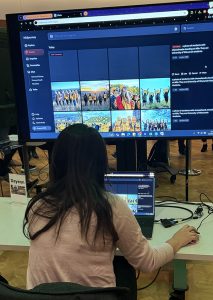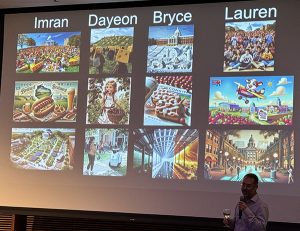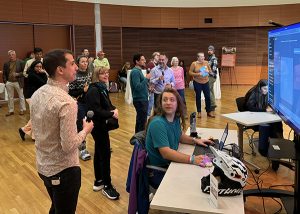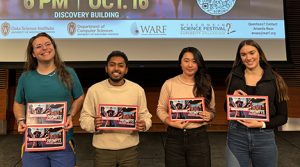WARF and Data Science Institute host second annual AI prompt competition
CONTACT:
Jeanan Yasiri Moe
Director of Strategic Communications and Public Affairs
[email protected] | (608) 960-9892
MADISON, Wis. – Following the success of MadPrompts 2023, the first generative artificial intelligence (AI) prompt battle on an American university campus, WARF and the UW-Madison Data Science Institute (DSI) hosted MadPrompts 2024 on October 16 in the Discovery Building’s H.F. DeLuca Forum. This year’s event, part of the Wisconsin Science Festival, featured four competitors from different academic disciplines using generative AI tools to create detailed images in response to challenges like, “Fill the hill with something other than flamingoes.”
“The event is a partnership with WARF and DSI, and it’s really great to showcase the cool things DSI does,” says WARF Accelerator Program Manager Lesli Mark, who planned the event with DSI and WARF staff.
“I think we accomplished our mission to engage the community with AI in a non-technical way,” Mark adds. “That’s the beauty of generative AI–you don’t have to be technical to leverage it. It is accessible to everyone.”
Year 2 of MadPrompts shows evolution of generative AI tools
 During three rounds of competition, the contestants had six minutes to generate an AI image in response to a prompt. This year, contestants could choose which generative AI tools to use for each challenge. Stable Diffusion, Google’s Gemma tools and ChatGPT4.0 were popular selections.
During three rounds of competition, the contestants had six minutes to generate an AI image in response to a prompt. This year, contestants could choose which generative AI tools to use for each challenge. Stable Diffusion, Google’s Gemma tools and ChatGPT4.0 were popular selections.
“We decided to allow more flexibility this year, in hopes we would see more variation in terms of how participants approached their prompts, and the audience was exposed to a variety of processes,” says DSI Director Kyle Cranmer. “Everyone really enjoyed it.”
This year’s student and staff contestants represented programs across campus, including Computer Sciences, Life Sciences Communication, Statistics, Economics, the Wisconsin Institute for Discovery and the School of Human Ecology.
“That shows we’re starting to broaden our reach,” says Mark.
Daeyon Eom, a doctoral student in life science communications who competed in MadPrompts for the first time this year, was drawn to the event because it combined creativity and technology.
“I was eager to see how other generative AI tools perform in a more creative context,” says Eom. “This event is a fantastic initiative that brings together people from different disciplines to collaborate and enjoy the creative process.”
 Returning contestant Bryce Sprecher, who holds degrees in computer science and neurology from UW-Madison and is an XR applications developer in the Virtual Environments Lab at the Wisconsin Institute for Discovery, could be found using multiple tools at once–entering a prompt into ChatGPT to generate a more detailed prompt that could then be entered into Dall-E to create an image.
Returning contestant Bryce Sprecher, who holds degrees in computer science and neurology from UW-Madison and is an XR applications developer in the Virtual Environments Lab at the Wisconsin Institute for Discovery, could be found using multiple tools at once–entering a prompt into ChatGPT to generate a more detailed prompt that could then be entered into Dall-E to create an image.
“That’s an interesting commentary on the evolution of generative AI tools and of the people using them,” says Mark. “They were using multiple tools and techniques.”
Another major change to this year’s contest was a video showcase including works created by Sprecher and DSI software developer Abe Megahed.
“As Abe’s video was playing, multiple people said, ‘I can’t believe that’s generated and not real,’” says Mark. “I was glad to be able to incorporate video into the event.”
“I wanted to understand what it might be like to not be constrained by the physical reality in video production or special effects,” says Sprecher. “I ran out of time way before I ran out of ideas.”
Lauren LeVoir, a junior majoring in computer science who competed in both years of MadPrompts, was motivated to return because of the improvements in generative AI over the past year.
“The energy and passion from the crowd, judges and contestants are contagious, and it makes the experience exciting and enjoyable,” LeVoir says. “The community I’ve found here is just as passionate about AI as I am, which makes MadPrompts even more special.”
MadPrompts audience continues to broaden
 The audience included children, undergraduate and graduate students, staff, faculty and community members. Retired computer scientist and STEM educator Gail Green, who recently completed an introductory AI class provided by PLATO, was among them.
The audience included children, undergraduate and graduate students, staff, faculty and community members. Retired computer scientist and STEM educator Gail Green, who recently completed an introductory AI class provided by PLATO, was among them.
“The MadPrompts event was definitely a fun night out, and it also served as a learning and idea generating event for me,” Green says. “I really appreciated the diverse backgrounds, approaches and typical AI uses of the four contestants. We were able to watch them work as we cruised past each of their jumbo monitors, and that was truly valuable.”
Scientific illustrator Kate Baldwin works for the UW-Madison Sustainability Research Hub and attended MadPrompts to see what’s realistically possible with generative AI, after testing Microsoft Designer and Adobe Firefly with limited success.
“MadPrompts was a perfect opportunity to see, in person, what a knowledgeable person can really make in six minutes using today’s publicly available programs,” Baldwin says. “I learned a lot during the event from watching the contestants. Although they used different programs, it looked like ChatGPT4.0 was the most popular. Most notable to me was how the contestants would write dozens of follow-up requests to edit the images the AI gave them. It seemed like the ability to specifically follow up on the last image was key to the contestant’s success.”
Based on what she learned, Baldwin has been trying AI programs that allow direct follow-up, like ChatGPT4.0.
Madison College student Detriona Owens attended with friends and enjoyed watching the contestants prompt the AI tools while creating images.
“Seeing how much technology has advanced since I was a kid was so cool,” Owens says. “Seeing someone create a picture by talking to the internet is above and beyond what we imagined back then.”
An inspiring event
 Cranmer emceed with Jeanine Burmania, senior director of IP and licensing at WARF. Judges Kaiser Pister, an instructor in the computer science department who has been part of two AI-based companies, and communications arts professor Aaron Greer gave the final honors. LeVoir was crowned “Most Creative;” Eon was dubbed “Most Professional;” Imran Iskander, a senior majoring in statistics and economics, was named “Most Whimsical;” and Sprecher received the “Most Eye-Catching” award, along with recognition for their video submission. Each contestant received a $200 gift card from WARF to recognize their accomplishments.
Cranmer emceed with Jeanine Burmania, senior director of IP and licensing at WARF. Judges Kaiser Pister, an instructor in the computer science department who has been part of two AI-based companies, and communications arts professor Aaron Greer gave the final honors. LeVoir was crowned “Most Creative;” Eon was dubbed “Most Professional;” Imran Iskander, a senior majoring in statistics and economics, was named “Most Whimsical;” and Sprecher received the “Most Eye-Catching” award, along with recognition for their video submission. Each contestant received a $200 gift card from WARF to recognize their accomplishments.
Cranmer and Mark say the event has solidified the WARF/DSI partnership and resulted in new collaborations like a panel discussion on open source, AI and innovation during Innovate Week.
“It’s been wonderful in terms of building the relationship between DSI and WARF,” Cranmer says. “At DSI, we want to raise awareness of these tools and find ways to engage with the campus and community, and MadPrompts is a great format for doing that.”
Participants agree that MadPrompts is a one-of-a-kind experience that showcases the best of generative AI and leaves people inspired.
“The event has this interesting performance art feel,” adds Cranmer. “People are mingling and watching, not separated from the creators, and even talking to them while they’re prompting. You don’t see that very much. The format is a mix of things, and that’s unique.”
“It felt less like a contest and more like an adventure,” says Iskander. “Every image was a surprise, and the whole experience left me inspired to explore even wilder ideas.”
About WARF
Incorporated as a nonprofit foundation in 1925, WARF has a founding purpose “to promote, encourage, and aid scientific investigation and research at and within the University of Wisconsin-Madison.” Over 99 years the foundation has funded more than $4.5 billion in cumulative research grants to UW-Madison and the Morgridge Institute for Research (adjusted for inflation), has been issued more than 4,200 patents (with 2,200 active patents), generates an additional 375 invention disclosures and 55 revenue-generating licenses each year, and has helped create 190 startup companies based on UW-Madison technologies. For more information, visit warf.org and watch a video about how WARF stewards the Cycle of Innovation.
About the Data Science Institute
The UW-Madison Data Science Institute (DSI) is central to UW-Madison’s strategic priority to grow its research enterprise and expand its global impact, supporting the scholarship of faculty, staff, and students. It was established in 2019 with a generous endowment gift from American Family Insurance. The DSI performs cutting-edge research in the fundamentals of data science and catalyzes the translation of this research into practice, to advance scientific discovery in collaboration with researchers across campus and beyond.
###
